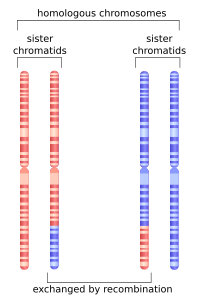
Photo from wikipedia
OBJECTIVE To elucidate the effect of cyclooxygenase 2 (COX-2) on cisplatin resistance of NSCLC and its molecular mechanisms, with special attention to its pro-EMT (epithelial-mesenchymal transition) properties. MATERIALS AND METHODS… Click to show full abstract
OBJECTIVE To elucidate the effect of cyclooxygenase 2 (COX-2) on cisplatin resistance of NSCLC and its molecular mechanisms, with special attention to its pro-EMT (epithelial-mesenchymal transition) properties. MATERIALS AND METHODS COX-2 levels were compared in two NSCLC cell lines, A549 and H460, by qPCR (quantitative Polymerase Chain Reaction) and Western blot. Cytotoxicity of cisplatin was also determined in the two cell lines using MTT (3-(4,5-dimethylthiazol-2-yl)-2,5-diphenyl tetrazolium bromide) assay. The expression of EMT-related proteins and activation of AKT (protein kinase B) signaling were detected in H460 cells with ectopic COX-2 expression. RESULTS Cisplatin-induced apoptosis was assessed in COX-2 overexpressing H460 cells by FACS. NS398, a COX-2 inhibitor, was also applied to determine EMT status and effect on cisplatin sensitivity in H460 cells. COX-2 levels were positively correlated with cisplatin resistance in both NSCLC cell lines tested. In response to COX-2 overexpression, EMT-related proteins, such as E-cadherin, were inhibited, while vimentin and N-cadherin were upregulated. The AKT signaling pathway was also activated in H460 cells. Ectopic expression of COX-2 potentiated cisplatin resistance of H460 cells, which was accompanied by decreased levels of apoptosis. Notably, NS398 effectively increased the cytotoxicity of cisplatin in A549 cells by inhibiting EMT and the AKT pathway. CONCLUSIONS COX-2 might promote cisplatin resistance in NSCLC by promoting EMT through the AKT signaling pathway activation.
Journal Title: European Review for Medical and Pharmacological Sciences
Year Published: 2019
Link to full text (if available)
Share on Social Media: Sign Up to like & get
recommendations!